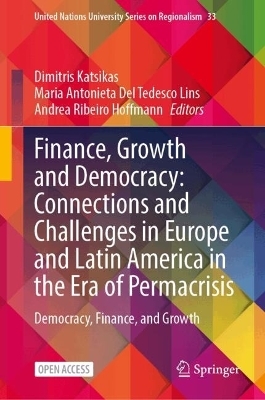
Finance, Growth and Democracy: Connections and Challenges in Europe and Latin America in the Era of Permacrisis
Springer International Publishing (Verlag)
978-3-031-68474-6 (ISBN)
- Noch nicht erschienen - erscheint am 06.11.2024
- Versandkostenfrei innerhalb Deutschlands
- Auch auf Rechnung
- Verfügbarkeit in der Filiale vor Ort prüfen
- Artikel merken
The present volume uses a comparative regional approach to analyze how permacrisis-an extended period of instability and insecurity-has been experienced and dealt with in the European Union (EU) and Latin America. Written by academicians and policy experts from both regions, the volume has three main objectives. Firstly, it critically evaluates the response of regional organizations and governments in the EU and Latin America to the crises that have shaken these regions in recent years. Secondly, chapters contribute to a better understanding of the promised benefits and risks of digital currencies and fintech more generally to economic growth, financial stability and inclusion. Finally, the volume promotes an understanding of the challenges of permacrisis in both the EU and Latin America, as well as encouraging their cooperation at the multilateral and bi-regional levels. Providing an interdisciplinary perspective, this volume will be of interest to researchers and students of international relations, international political economy, international finance and economics, international law, global governance, and regionalism, as well as public officials of ministries of foreign affairs, finance and the economy, public officials of international and regional organizations.
This is an open access book.
Dimitris Katsikas is Assistant Professor of International and European Political Economy and Director of the Research Centre for Economic Policy, Governance and Development at the Department of Political Science and Public Administration at the National and Kapodistrian University of Athens (Greece). He studied Business Administration at the Athens University of Economics and Business and continued his postgraduate studies in finance and international political economy at the London School of Economics (LSE). He received his PhD from LSE in the field of international political economy. His research focuses on international and European political economy, international and European monetary, financial and economic governance, and the role of non-state actors in global economic governance.
Maria Antonieta´s presentation to be used is : Maria Antonieta Del Tedesco Lins is Associate Professor at the Institute of International Relations of the University of São Paulo (IRI-USP), Brazil. She holds a PhD degree in Economics from the Getulio Vargas Foundation - SP, a Master degree in Public Administration and Government from the Getulio Vargas Foundation - São Paulo (FGV-SP), another from the Universiteit Antwerpen, Belgium, and is graduated in Economics at the University of Sao Paulo. She was a postdoctoral fellow at the Center for Latin American and Latino Studies - American University, Washington DC, USA. Her main research interests in International Political Economy are particularly on issues related to international finance, international financial governance, emerging and financial system, macroeconomic coordination, and multilateral institutions.
Andrea´s presentation to be used is the following: Andrea Ribeiro Hoffmann is Associate Professor at the Institute of International Relations of the Catholic University of Rio de Janeiro (PUC-Rio), and a Collaborating Professor at the Federal University of Latin American Integration (UNILA), Brazil. She has a Ph.D. from the University of Tübingen, Germany, and has been a visiting scholar at the London School of Economics (UK), University of Erfurt and the Free University of Berlin (Germany). Her research focuses on Latin American Regionalism, Comparative Regionalism, Inter-regional relations between the European Union and Latin America, and Legitimacy and Democracy at the Global Level.
Introduction.- Authoritarian practices of the radical right and the crisis of multilateralism in Latin America.- The regional institutions and democratic crisis in Latin America: an evaluation.- A comparative look at EU' s economic crisis management, democracy and integration: A Hamiltonian moment for the EU?.- Fighting crime, preserving democracy in Latin America.- Revisiting the democratic foundations of European integration during the permacrisis.- Failing to tackle 'too-big-to-fail' banks in the European Union.- Financing recovery and development in the post-pandemic EU: issues of strategy, institutions and implementation.- Economic policies amid political instability in Latin America.- How the Crises Have Redefined the Instruments for Trade and Investment Between the EU and Latin America.
| Erscheint lt. Verlag | 6.11.2024 |
|---|---|
| Reihe/Serie | United Nations University Series on Regionalism |
| Zusatzinfo | Approx. 240 p. |
| Verlagsort | Cham |
| Sprache | englisch |
| Maße | 155 x 235 mm |
| Themenwelt | Sozialwissenschaften ► Politik / Verwaltung ► Europäische / Internationale Politik |
| Sozialwissenschaften ► Politik / Verwaltung ► Vergleichende Politikwissenschaften | |
| Schlagworte | Comparative Regionalism • Democracy • Democratic Backsliding • digital currency • Economic Growth • European Integration • European Union • Finance • Financial Governance • FinTech • Latin America • open access • permacrisis • Radical Right • Sovereign debt |
| ISBN-10 | 3-031-68474-5 / 3031684745 |
| ISBN-13 | 978-3-031-68474-6 / 9783031684746 |
| Zustand | Neuware |
| Haben Sie eine Frage zum Produkt? |
aus dem Bereich


